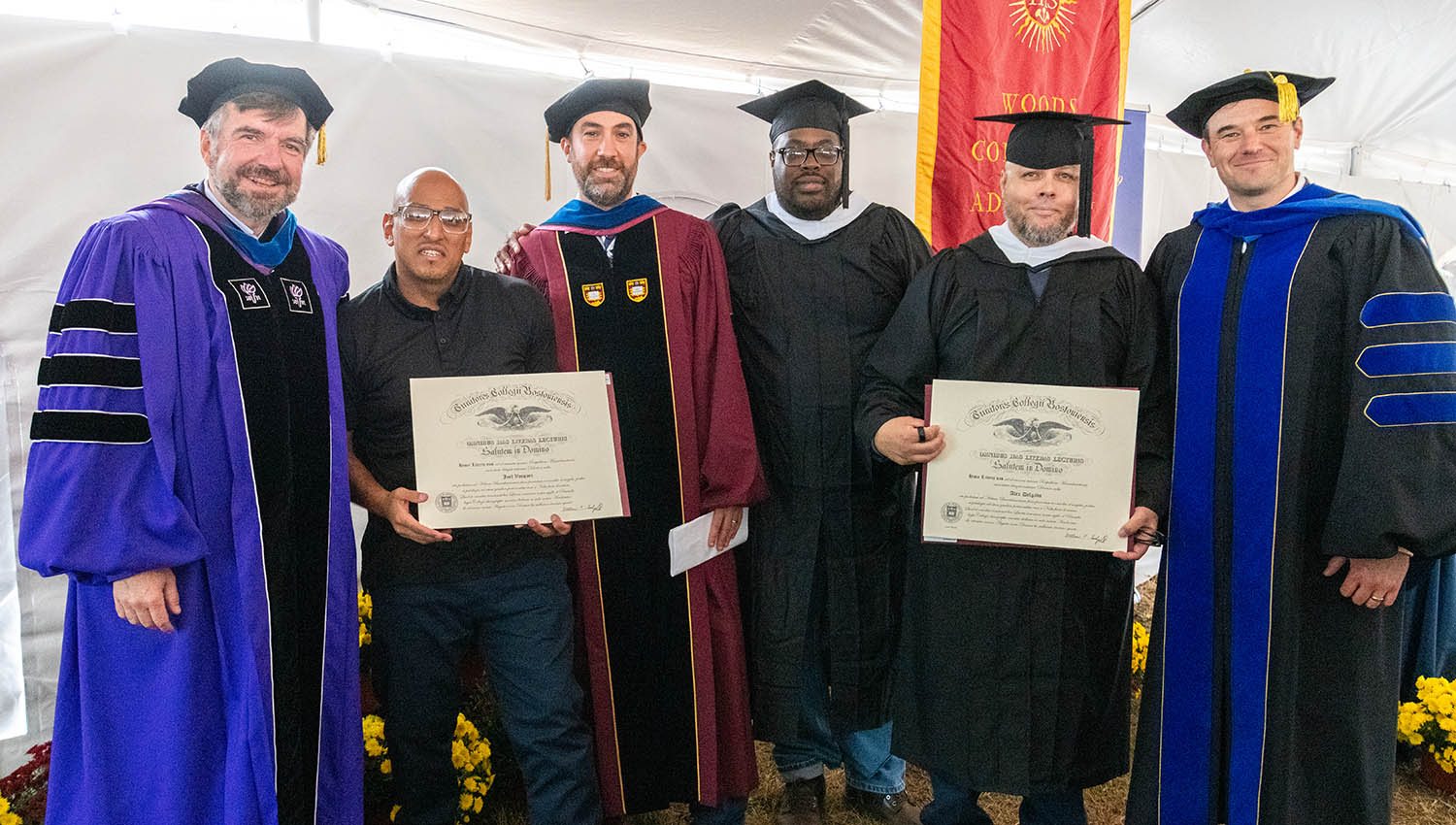BC Prison Education Program holds first graduation ceremony
In 2019, Boston College launched the Prison Education Program (PEP), offering 16 incarcerated students at a medium-security correctional facility in Shirley, Mass., a chance to take college-level courses with BC instructors. Five years later, the program has admitted 80 students across five cohorts, becoming the largest higher education prison program in the Commonwealth. On September 23, it hosted its first-ever commencement ceremony inside the prison yard at MCI-Shirley, awarding diplomas to three graduates before an emotional crowd of students, family members, and supporters.
“I’m so impressed with all three of you,” said Associate Professor of the Practice Cherie McGill, who teaches philosophy in the PEP. “You’ve worked hard for an education, which is so much more than a degree, and you’re walking away today with genuinely impressive intellectual depth.”
Dressed in caps and gowns, the three graduating students—Alex Delgado, Gregory Saunders, and Joel Vasquez—formed a miniature procession as they entered the commencement tent to a band playing ‘Pomp and Circumstance.’ They were trailed by more than 30 current PEP students, who showed their support throughout the ceremony with cheers and shouts of encouragement.
Former New England Patriots cornerback Devin McCourty surprised attendees by delivering a commencement address via Zoom, encouraging the graduates to use their diplomas as a starting point, and set an example for the students coming up behind them.
“You are now in a position of leadership, both in attitude and performance” he said. “You’re kicking the doors off the hinges so everyone else can walk though, and I can’t wait to see what you become.”

From left: Provost David Quigley, Joel Vasquez, PEP Ignacio Chair Patrick Conway, Gregory Saunders, Alex Delgado, and Woods College Dean David Goodman.
Other speakers included Provost and Dean of Faculties David Quigley and Woods College of Advancing Studies Dean David Goodman, both of whom teach courses in the program, followed by Patrick Conway, inaugural Ignacio Chair of the Prison Education Program, and Department of Correction Interim Commissioner Shawn Jenkins.
All three graduates also delivered heartfelt remarks, reflecting on their experiences and the meaning of a liberal arts education. Saunders, the class valedictorian, described a phone conversation with his father after he was accepted to the program five years ago.
“I told him I was studying the liberal arts and he said, ‘How are you going to make money with that?’” Saunders recalled. “For my father, education was instruction—you’re supposed to learn how to do something. But knowing how something works is not the same as knowing why something works. I told my father, ‘I’m going to learn the why.’”
Vasquez, who organized a PEP event celebrating 9/11 hero Welles Crowther ’99, received the Social Justice Award for his contributions to the PEP community. With his mother and sister in the audience, he reflected on his childhood, crimes, and non-traditional educational journey, invoking poet Langston Hughes’s notion of a “dream deferred.”
“I’m sorry for the pain I caused you,” he said to his mother, who wore a Boston College shirt and held back tears throughout the ceremony. “I hope today I have finally made you proud, that your dream that was deferred has finally been fulfilled.”
The PEP offers a mix of liberal arts and modern business courses in subjects ranging from literature and the social sciences to public speaking and entrepreneurship. Students spend roughly 10 hours a week in class, and outside of that time they remain busy with assignments and group projects, office hours and tutoring sessions, and extracurricular activities like an inter-cohort debate. Every fall, a new cohort is admitted through a competitive admissions process, growing the PEP community inside the prison.
A smaller community of PEP students is also forming on BC’s main campus, where 10 formerly incarcerated students have enrolled at the Woods College of Advancing Studies. Many credit the program with giving them the skills and confidence to pursue higher education after their release.
“I continue to think that we are building something truly special with this program that can continue to serve as a model nationally for what is possible when a university is committed to providing high quality education within carceral settings,” said Conway, who has led the program since 2021. “We haven't taken shortcuts.”
Scenes from the ceremony
At Monday’s graduation, Alex Delgado reflected on his journey from gang leader to Boston College alumnus. Since he is serving a life sentence without parole, Delgado has committed to putting his PEP education to use behind bars, helping to organize a restorative justice working group with UMass Boston, serving on the advisory board for the National Institute of Justice, and becoming vice-chairman of the American Veterans in Prison group.
“Knowledge precedes action,” he said. “Thank you, BC, for helping me to become a freedom fighter.”
After collecting their diplomas, the graduates mingled with students, family members, and supporters from Boston College and the Department of Correction, posing for photos and enjoying the festive atmosphere before returning to their cells. In conversation, all three expressed gratitude to the program and its supporters, as well as pride in their status as BC alumni. The admiration was mutual.
“I’ve been lucky to teach in a range of settings and to be educated in kind by a wonderful mix of students,” said Quigley. “As anyone who has taught in this program knows well, teaching here opens one to a classroom full of powerful lessons and one rich with possibilities. The liberal arts, here at Shirley, are a matter of immense power.”
Dean Goodman echoed those sentiments in his remarks, challenging the graduates to live fully and resist over-managing their own experiences.
“The rigorous and world-transforming work of a liberal arts education is to open us up and point ever expansively to something greater,” he said. “It’s not to assist in making life more manageable, but rather more true, good, and beautiful. I certainly hope this is what you’ve found during your BC education.”
